Writers: Simon Beaufoy, Michael DeBruyn, Suzanne Collins
Released: November 22, 2013
Genre: Adventure, Sci-Fi, Thriller
Budget: $130,000,000
Gross: $864,543,193
Production Companies: Lionsgate, Color Force
Runtime: 146 minutes
Rating: PG-13
Sound mix: Dolby Digital, Datasat, Dolby Atmos
Aspect Ratio: 2.35 : 1
Synopsis:
The Hunger Games: Catching Fire begins with Katniss(Jennifer Lawrence) back at home in District 12. President Snow(Donald Sutherland) pays her a visit and tells Katniss that in order to save her loved ones she must convince him that she really does love Peeta Mellark(Josh Hutcherson).
The winners of the 74th annual Hunger Games, Katniss and Peeta, then go on their victory tour through all twelve districts of Panem. However, as they tour the districts the two begin to realize that they have instilled an uprising upon the Capitol.
When they arrive back home peacekeepers arrive in large numbers and terrorize District 12. Also, President Snow announces that this year's Hunger Games will be one where only victors of previous Hunger Games shall fight. This puts Katniss and Peeta's wedding plans on hold. Katniss, being the only girl in district 12 to have won, was selected as female tribute. Meanwhile, Haymitch(Woody Harrelson) was selected as male tribute between him and Peeta. Although Peeta volunteers as tribute. Making this Katniss and Peeta's second consecutive Hunger Games together as tributes.
The two then set off for the Capitol to prepare for the 75th annual Hunger Games. Cinna(Lenny Kravitz) gives Katniss her wedding dress to wear to her interview with Ceaser(Stanley Tucci) which has been rigged to burn onstage and transform into a dress that resembles a mockingjay.
Becuase of Cinna's assistance in the Rebellion he is brutally beaten in front of Katniss right before she is released into this year's arena.
Although prior to the games Katniss chose to have no allies in the Games. Once in there she begins to realize that a lot of the tributes are on her side.
In a very daring attempt to end the Games for good, Katniss attaches a wire connected to a large tree in the middle of the arena to an arrow. This tree is struck by lightening every 12 hours. When the lightening struck the tree Katniss quickly shot the arrow toward the ceiling of the arena. Her attempt works. She hits the ceiling and shuts down the entire arena.
A claw then descends from the sky and grabs Katniss's body and carries her away.
In the conclusion of the film Katniss wakes up confused and finds Haymitch, Beetee(Jeffrey Wright), Finnick(Sam Claflin), and head gamemaker, Plutarch Heavensbee(Philip Seymour Hoffman) all speaking in a room. Desperate and angry Katniss threatens them. Then Haymitch sedates her.
Katniss wakes up again to find Gale(Liam Hemsworth) by her side. He tells her that her sister and mother were safe but that District 12 ceased to exist.
Commentary:
The Hunger Games: Catching Fire clocks in at about 2 hours and 26 minutes and every second was well worth my time. The film was brilliantly directed and Jennifer Lawrence proved a strong lead. She was fearless in her portrayal of the heroine. But it was the sense of oppression bestowed on J Law's character, Katniss Everdeen, that struck a sad note for me throughout the film.
In the beginning of the film Katniss shows a bit of romance for her hunting buddy, Gale Hawthrone. She returns home from the woods just outside of her district to come to find President Snow in her house. He knows that she shares a romance with Gale. However, since she expressed a love for her fellow tribute Peeta Mellark in the Hunger Games arena the year before, he insists that she must not only convince the Capitol that she loves Peeta but she must convince him. If she doesn't then the lives of her loved ones are in jeopardy. Not only did Katniss have to oppress her feelings for Gale to convince President Snow she loved Peeta. But she had to oppress her feelings for him to protect him as well.
The film also displayed it's theme of oppression when Katniss is on the Victory tour and at the reaping for the 75th annual Hunger Games. In both instances the people of Panem protested. The peacekeepers would use violent force to keep them under control and Katniss trying to stop the Peacekeepers was briskly taken away by the peacemakers (which by the way do the exact opposite of what they are called. Instead of keeping peace they create chaos.) In the scene where she is taken away after she was assigned tribute at the reaping the peacekeepers wouldn't even let her say bye to her family or loved ones.
The most intense scene in the film that hit me hardest was the scene where Cinna was brutally beaten. She was behind the glass wall ready to go into the arena when peacekeepers barged in and beat Cinna right in front of her face. This time instead of people holding her back it was the glass wall. She watched him get beaten mercilessly and really had no control. As she watched she began ascending into the the arena where she would fight for her life.
However, the turning point where the theme of oppression seems to dilute is when Katniss shoots the ceiling of the arena. That break in the ceiling where she saw the actual sky and the ceiling of the arena crumbled was like a break in the constant oppression she experienced throughout the film. Now she was in control. She was the one that shut down the Games. She was the one who freed herself. As she was lifted into the sky it was reminiscent of a soul leaving the body. She appeared to be free. Everything underneath her burned as she rose up. Her being lifted up into the sky represented her uprising. It represented the revolution.

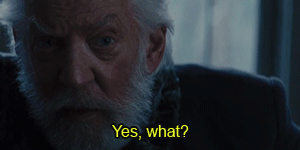
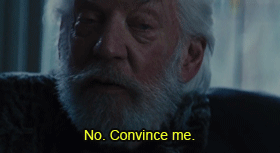
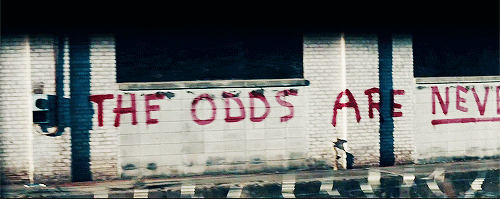
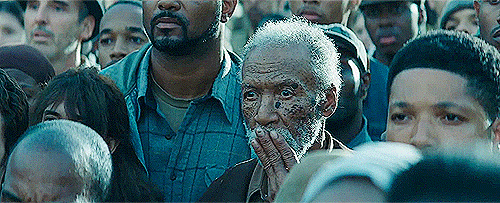
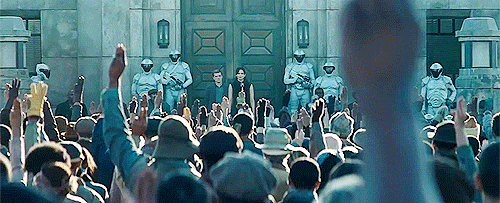
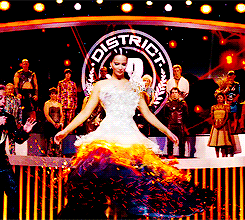

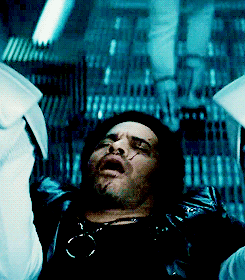


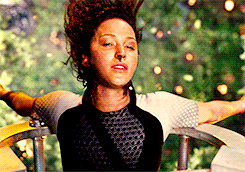

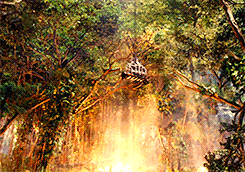



No comments:
Post a Comment